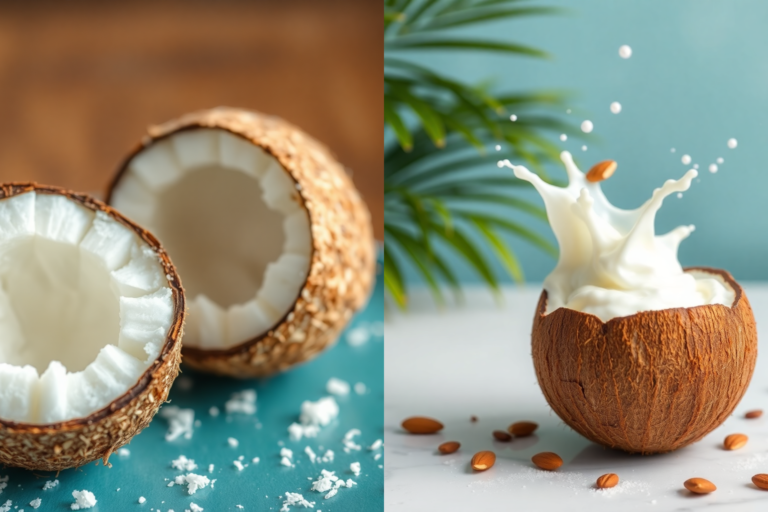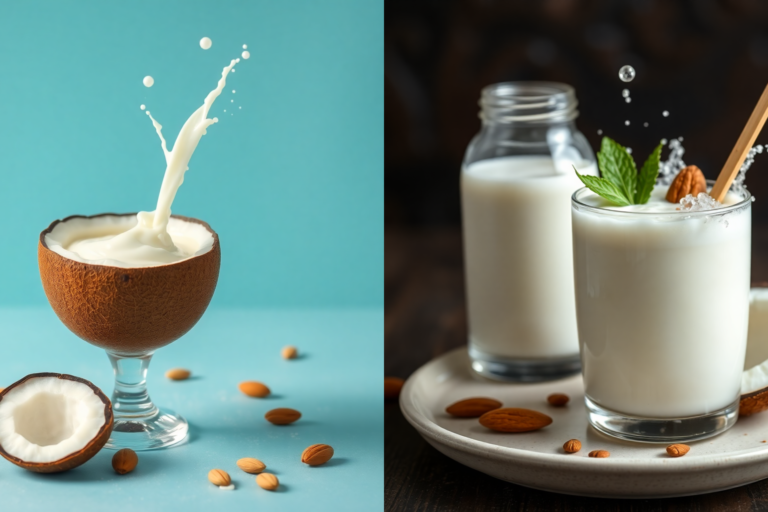Introduction to Grated Coconut
Grated coconut is a staple ingredient that has found its way into kitchens across the globe due to its incredible versatility and unique flavor profile. Whether used fresh or dried, grated coconut adds a rich, nutty taste and texture to both sweet and savory dishes. As an essential component of many traditional recipes, grated coconut is cherished not just for its culinary applications but also for its health benefits.
The Versatility of Grated Coconut
Grated coconut can be incorporated into a wide range of dishes, making it a go-to ingredient for home cooks and professional chefs alike. From adding depth to baked goods and confections to being used as a garnish for salads and curries, grated coconut truly shines in diverse culinary traditions. Its use spans from tropical desserts like coconut muffins and coconut pie to savory dishes such as coconut rice or seafood curries, making it a versatile pantry essential.
Why Grated Coconut Is Popular in Health and Culinary Uses
Grated coconut is not only known for its culinary adaptability but also for the numerous health benefits it offers. Rich in healthy fats, especially medium-chain triglycerides (MCTs), grated coconut supports energy production and metabolic health. It also provides essential dietary fiber, which aids in digestion and promotes gut health. Its high mineral content, including iron, magnesium, and zinc, adds to its appeal as a nutrient-dense ingredient. Because of these benefits, grated coconut is a popular choice for health-conscious individuals looking to enhance their meals with natural and wholesome ingredients.
Grated coconut’s appeal extends beyond health to its convenience and ease of use. Whether bought pre-packaged or prepared fresh, it can be added to recipes with minimal preparation, making it a practical choice for busy cooks who value both nutrition and flavor.
In summary, grated coconut’s versatility, nutritional value, and accessibility make it a standout ingredient in both health-focused and gourmet kitchens. Whether you’re baking a batch of coconut scones or creating a creamy coconut soup, incorporating grated coconut can elevate your dishes and provide a nutrient-rich boost.
Benefit 1: Rich Source of Nutrients
Introduction to the Nutritional Benefits of Grated Coconut
Grated coconut is more than just an ingredient for enhancing the texture and flavor of your dishes; it is a nutritional powerhouse packed with essential vitamins, minerals, and other important nutrients. Whether you use grated coconut in your baking, cooking, or as a garnish, its nutritional profile can make a significant contribution to your overall health.
Key Nutrients in Grated Coconut
High in Dietary Fiber
One of the most notable benefits of grated coconut is its rich fiber content. Fiber is an essential nutrient that supports digestive health, aids in maintaining a healthy weight, and helps control blood sugar levels. Consuming fiber-rich foods like grated coconut can promote regular bowel movements and support a healthy gut microbiome. The fiber in grated coconut also helps create a feeling of fullness, which can be beneficial for weight management and appetite control.
Rich in Manganese
Manganese is a trace mineral found in abundance in grated coconut. This nutrient plays a crucial role in the body’s antioxidant defenses and supports the metabolism of carbohydrates, proteins, and cholesterol. Manganese is also essential for the formation of connective tissue and bone, making it a vital part of maintaining skeletal health. By including grated coconut in your diet, you can help ensure you meet your daily manganese needs and support overall metabolic function.
A Good Source of Iron
Grated coconut is also a valuable source of iron, an essential mineral that supports the production of red blood cells and helps transport oxygen throughout the body. Iron deficiency can lead to fatigue and reduced immunity, making it important to include iron-rich foods in your diet. The iron in grated coconut is particularly beneficial for those following plant-based diets, as it can help bridge the gap where heme iron sources (found in animal products) are limited.
Essential Vitamins in Grated Coconut
Beyond minerals, grated coconut also contains important vitamins such as vitamin C and several B vitamins:
- Vitamin C: Although present in smaller amounts, vitamin C contributes to the immune system’s health and helps the body absorb iron more efficiently. It also plays a role in skin health and supports the formation of collagen, a protein that maintains skin elasticity and integrity.
- B Vitamins: The presence of B vitamins, including B1 (thiamine), B3 (niacin), and B5 (pantothenic acid), helps support energy production and metabolic processes. These vitamins contribute to maintaining nerve function, converting food into energy, and promoting healthy skin.
Why You Should Add Grated Coconut to Your Diet
Incorporating grated coconut into your daily meals is an excellent way to boost your nutrient intake. Whether sprinkled on top of your morning oatmeal, added to smoothies, or used in baking recipes, grated coconut provides a wide range of vitamins and minerals that can support general health and well-being. Its nutrient density and versatility make it an easy addition to many types of cuisines.
Benefit 2: Supports Heart Health
The Role of Healthy Fats Found in Grated Coconut
Grated coconut, whether used in cooking or as an ingredient in various recipes, is an excellent source of healthy fats. These fats are predominantly medium-chain triglycerides (MCTs), which are unique because they are metabolized differently than long-chain fatty acids. Unlike other types of fat that are stored in the body, MCTs are quickly converted into energy by the liver, providing a quick source of fuel. This distinctive property of the healthy fats in grated coconut makes it an ideal food for those looking to maintain energy levels without contributing to fat accumulation.
How Grated Coconut Supports Cardiovascular Health
In addition to its role as an energy source, grated coconut has several heart-healthy benefits that support cardiovascular health. One of the key factors is its potential to help regulate cholesterol levels. While some individuals might be concerned about the saturated fat content in coconut, research has shown that the type of saturated fat found in grated coconut is less likely to contribute to heart disease compared to the long-chain saturated fats found in animal products. The MCTs present in grated coconut can help improve the levels of high-density lipoprotein (HDL), known as “good” cholesterol, while potentially reducing levels of low-density lipoprotein (LDL), or “bad” cholesterol.
This balanced approach helps support heart health by promoting a favorable cholesterol profile. Regular consumption of grated coconut, in moderate amounts, can be part of a heart-healthy diet, particularly when combined with other nutritious foods and an active lifestyle. The presence of antioxidants in grated coconut also contributes to reducing inflammation and oxidative stress, which are significant factors in the development of heart disease.
How Grated Coconut Aids in Cholesterol Balance
The healthy fats found in grated coconut contribute to cholesterol balance in a few ways. Unlike trans fats and other unhealthy fats that can elevate LDL cholesterol, the medium-chain fatty acids in grated coconut support the body’s natural cholesterol metabolism. This can lead to improved heart health and a reduced risk of conditions such as atherosclerosis, which is the hardening and narrowing of the arteries due to cholesterol plaque buildup.
Grated coconut also contains compounds that support metabolic processes, which may further assist in managing cholesterol levels. Including grated coconut in your diet—such as in smoothies, baked goods, or as a topping for salads—can provide a delicious, heart-supporting ingredient that aligns with a balanced, heart-healthy eating plan.
The Heart-Healthy Benefits of Including Grated Coconut in Your Diet
Incorporating grated coconut into your meals can be both nutritious and flavorful. Whether you sprinkle it on your breakfast bowl, blend it into a smoothie, or mix it into savory dishes, the heart-healthy fats in grated coconut provide more than just flavor—they support a well-rounded cardiovascular health plan.
When looking for ways to include heart-healthy foods in your diet, remember to pair grated coconut with a variety of fruits, vegetables, whole grains, and lean proteins. This combination will help you maximize the benefits of the healthy fats found in grated coconut and create a balanced diet that supports long-term heart health.
Benefit 3: Aids Digestion – Grated Coconut as Your Digestive Ally
The Power of Grated Coconut for Digestive Health
Grated coconut, especially when used as desiccated coconut, is an excellent source of dietary fiber. Fiber is an essential component of a balanced diet, playing a vital role in promoting healthy digestion. By incorporating grated coconut into your meals, you can harness the power of this natural ingredient to support your digestive system and maintain gut health.
How Grated Coconut Supports Digestive Function
The fiber content in grated coconut primarily consists of insoluble fiber, which adds bulk to stool and helps it pass more smoothly through the digestive tract. This type of fiber acts as a natural laxative, which can help prevent and alleviate constipation. By promoting regular bowel movements, grated coconut contributes to overall digestive wellness, reducing the risk of bloating, discomfort, and digestive issues.
The Benefits of Fiber from Grated Coconut
In addition to preventing constipation, the fiber found in grated coconut supports a healthy gut microbiome. A well-functioning gut is home to a balance of beneficial bacteria, and dietary fiber acts as a prebiotic, feeding these good bacteria. This contributes to improved digestion, better nutrient absorption, and enhanced immune function.
Including grated coconut in your daily diet can be an effective way to ensure that you are getting sufficient fiber, which is often lacking in modern diets. The high fiber content of grated coconut not only assists in digestion but also supports long-term gut health.
How to Use Grated Coconut for Optimal Digestive Benefits
Incorporating grated coconut into your diet is simple and versatile. You can add it to breakfast foods like oatmeal, yogurt, or smoothies, providing a nutrient boost and promoting digestive health from the start of the day. Grated coconut can also be mixed into baked goods, salads, or savory dishes to enhance their fiber content and support healthy digestion.
Adding grated coconut to meals helps create a balanced diet rich in nutrients that benefit more than just the digestive system. As a natural source of fiber, grated coconut is an easy and tasty way to ensure that your digestive health is well-maintained.
Benefit 4: Boosts Energy and Metabolism
How Grated Coconut Provides a Quick Energy Boost
One of the standout benefits of grated coconut is its ability to supply a rapid and sustained source of energy. This is primarily due to its content of healthy fats and medium-chain triglycerides (MCTs). Unlike long-chain triglycerides found in many other fats, MCTs in grated coconut are metabolized differently. They are quickly absorbed by the liver and converted into energy, providing an instant boost that can help power through a busy day or an intense workout. This characteristic makes grated coconut a go-to choice for those needing a natural, quick energy source without the crash associated with refined sugars and carbohydrates.
The Role of Healthy Fats in Energy and Metabolism
Grated coconut is rich in healthy, plant-based saturated fats, which are known to be beneficial for the body when consumed in moderation. These fats not only provide a dense energy source but also support metabolic functions. When these healthy fats from grated coconut are consumed, they help maintain a steady level of energy and can even aid in boosting metabolism. This is because MCTs found in grated coconut are processed by the liver and quickly converted into ketones, which are used as an efficient fuel source for the body and brain.
The presence of MCTs in grated coconut can help improve metabolic rate by enhancing the body’s ability to burn calories more efficiently. This is especially valuable for individuals who are focused on maintaining or losing weight. By increasing metabolic rate and providing energy that lasts longer, grated coconut can help individuals avoid energy dips and hunger cravings that might otherwise lead to unhealthy snacking or overeating.
Weight Management Benefits with Grated Coconut
One of the additional advantages of incorporating grated coconut into your diet is its potential to support weight management. The combination of healthy fats and dietary fiber in grated coconut promotes feelings of fullness and helps control hunger, reducing the likelihood of excessive eating. The MCTs not only offer a quick energy boost but also help regulate blood sugar levels, which can be beneficial for reducing cravings and balancing appetite. This makes grated coconut an excellent choice for those looking to support their weight management goals in a nutritious way.
In summary, grated coconut is an exceptional ingredient for boosting energy levels and enhancing metabolism due to its rich content of healthy fats and MCTs. Whether added to smoothies, baked goods, or savory dishes, grated coconut not only enhances flavor and texture but also provides powerful nutritional benefits that support sustained energy and metabolic health. Embrace grated coconut as a simple yet effective way to supercharge your daily diet with long-lasting energy and optimal metabolic support.
Benefit 5: Versatile Ingredient for Healthy Recipes
Grated Coconut in Healthy Recipes
Grated coconut is a versatile ingredient that can be seamlessly incorporated into a wide variety of dishes, enhancing both flavor and nutrition. Whether you’re preparing a refreshing smoothie, a vibrant salad, or a decadent dessert, grated coconut adds a delightful texture and a subtle, natural sweetness that complements countless recipes. Its adaptability in the kitchen makes it a staple for those looking to elevate their meals while reaping its nutritional benefits.
Smoothies and Beverages with Grated Coconut
One of the simplest ways to incorporate grated coconut is by adding it to smoothies. The natural richness of grated coconut lends a tropical flair to your beverage, creating a creamy, satisfying texture. Blend grated coconut with your favorite fruits like pineapple, mango, and banana, and add a splash of coconut water or almond milk for a revitalizing, nutrient-packed drink. Coconut smoothies are perfect for breakfast or as an energy-boosting afternoon snack.
Salads Enhanced with Grated Coconut
Grated coconut can bring an unexpected twist to salads, contributing a light, nutty flavor that pairs beautifully with fresh ingredients. Use grated coconut as a topping for fruit salads, where it enhances the sweetness of pineapple, papaya, and berries, or mix it into green salads for a touch of crunch. Its slightly chewy texture can add depth to grain-based salads, such as quinoa or rice salads, providing a contrast to crisp vegetables and tangy dressings.
Baking and Desserts Using Grated Coconut
For those who love to bake, grated coconut is an indispensable ingredient. It can be used in a range of sweet recipes, including coconut muffins, coconut macaroons, and classic coconut cakes. The natural oils in grated coconut help to create moist, flavorful baked goods, while adding a subtle, tropical aroma. Additionally, grated coconut can be used to coat candies or incorporated into no-bake desserts like coconut truffles and energy balls. Sprinkle it on top of oatmeal or yogurt bowls for a nutritious and tasty addition that pairs well with fruits and nuts.
Cooking with Grated Coconut: Savory Dishes
While grated coconut is often associated with desserts, it also plays a role in savory dishes, especially in tropical cuisines. It can be used as a garnish for curries, soups, and stews, adding a subtle sweetness and complex flavor that balances the spices. In many South Asian recipes, grated coconut is sautéed with mustard seeds, turmeric, and curry leaves to create a rich base for various curries and vegetable dishes. Its versatility ensures that grated coconut can be added to many culinary creations, whether they are sweet or savory.
Quick Ideas for Using Grated Coconut
Here are a few quick ideas to make the most of grated coconut:
- Coconut Rice: Add grated coconut to steamed rice along with a pinch of salt and a few drops of coconut oil for a flavorful side dish.
- Energy Bites: Combine grated coconut with dates, almonds, and a touch of honey to create homemade energy bites perfect for a healthy snack.
- Tropical Porridge: Stir grated coconut into oatmeal or chia pudding, topping with sliced fruit and a drizzle of honey for a breakfast packed with nutrients.
- Coconut Chutney: Blend grated coconut with green chilies, ginger, and a few spices to create a flavorful condiment that pairs perfectly with dosas, idlis, and other Indian dishes.
Why Choose Grated Coconut?
Grated coconut stands out not only for its versatility but also for the range of nutrients it offers. It’s a natural source of healthy fats, dietary fiber, and essential minerals, making it a great addition to a balanced diet. Its ability to enhance both sweet and savory dishes means that you can enjoy the benefits of grated coconut without limiting yourself to just one type of cuisine or recipe.
Conclusion
Grated Coconut is more than just a versatile ingredient for your kitchen; it’s a powerhouse of nutrients that can greatly enhance your diet. From promoting healthy digestion to boosting energy levels and supporting heart health, the benefits of grated coconut are truly impressive. This natural superfood is packed with healthy fats, dietary fiber, essential minerals, and unique compounds like lauric acid that provide antimicrobial properties.
Whether you use grated coconut in savory dishes like curries and rice, or in baked goods and smoothies, its ability to add texture, flavor, and a nutritional punch makes it a must-have in your pantry. Its rich fat content, particularly medium-chain triglycerides (MCTs), provide quick energy and promote a healthy metabolism, making grated coconut an excellent option for those who lead an active lifestyle or are simply looking to maintain a balanced diet.
For those on gluten-free or low-carb diets, grated coconut is an ideal choice, adding variety and satisfaction to your meals without sacrificing nutritional value. Its fiber content supports digestive health and can aid in weight management by promoting feelings of fullness. Moreover, the long shelf life of grated coconut makes it a convenient staple to keep on hand for any culinary occasion.
Incorporating grated coconut into your diet doesn’t have to be complicated. Start by adding it to your morning oats, sprinkle it over salads, blend it into smoothies, or use it as a topping for yogurt. Baking enthusiasts can experiment with coconut muffins, cookies, or scones to enjoy the naturally sweet flavor and nutritional benefits. The possibilities are endless, and the health advantages make it worthwhile.
Don’t miss out on the nutritional boost that grated coconut offers. Make it a part of your daily diet and explore its diverse uses in cooking and baking to experience firsthand how this simple ingredient can elevate your health and your meals.











